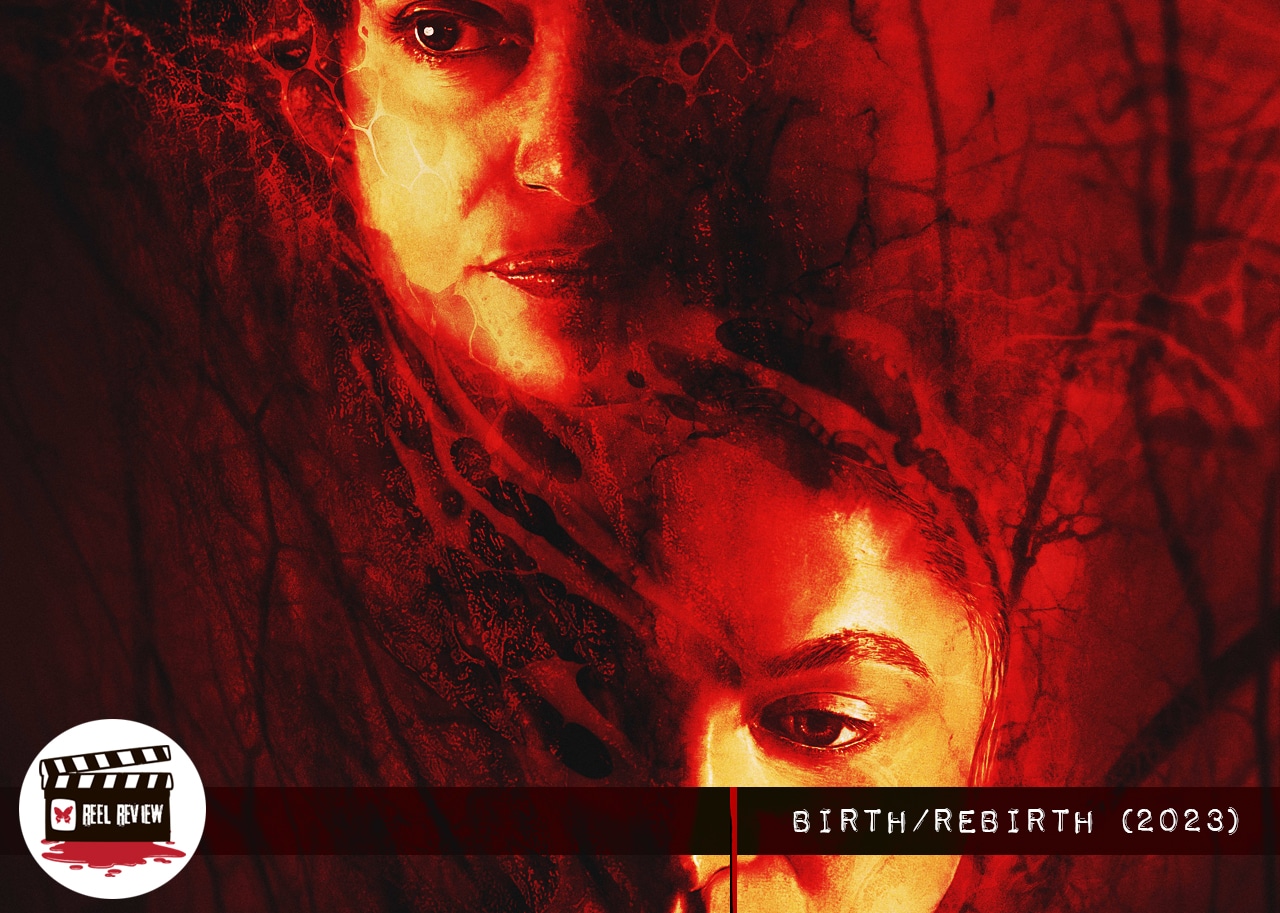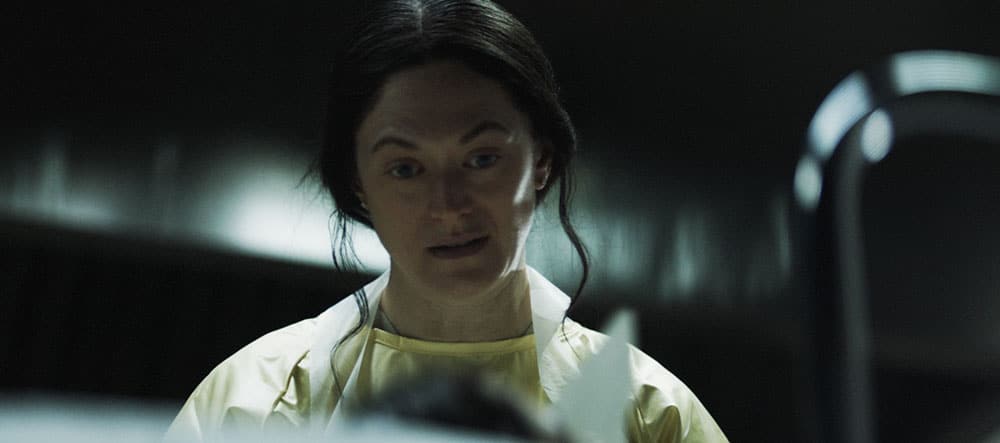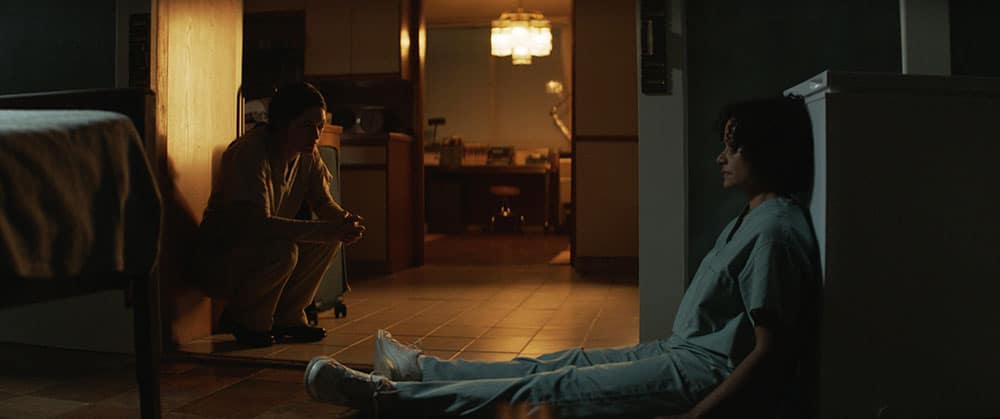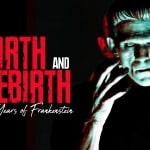A staggering work of feminist horror, “Birth/Rebirth” finds familiar inspiration in the depth and emotional weight of “Frankenstein”.
Birth/Rebirth wastes no time making an impression, immediately thrusting viewers into a nightmarish scene where a distressed mother-to-be is rushed to the hospital in an ambulance for an emergency c-section.
We view the harrowing scene from her terrified POV, witnessing the chaos through increasingly obscured vision. Our stomachs twist as we watch the doctors methodically zero in on saving the baby while showing little to no regard for the mother’s well-being.
“Your baby’s going to be fine,” a well-meaning surgeon tells her as they rip the newborn from her belly and whisk it away to begin lifesaving work. In a moment of gut-wrenching agony, she meekly asks, “What about me?”
It’s a question no one bothers to answer or even concern themselves with as she’s left on the table to seize and die while doctors fret over the unresponsive infant.
The camera then makes an abrupt cut to the gruesome overhead shot of the young mother’s naked corpse, sliced open and gutted to harvest her organs, reduced to nothing more than an incubator and life-giving vessel.
It’s a brutal and brilliant opening scene that addresses the fears many women have surrounding motherhood and their perceived worth (or lack thereof) outside of their desire to bring life into the world.
It also boldly announces that Birth/Rebirth isn’t just another predictable adaptation of a well-tread classic.
Most Frankenstein-inspired stories center squarely on a quest for God-like power in which a male usurps the role of women by singlehandedly bringing life into the world through the power of science over nature.
But Birth/Rebirth is a female-centric story about the agony and ecstasy of motherhood in all its grisly and heartbreaking glory.
Though it still explores the novel’s most prominent themes of life and death and the morality of resurrection, Birth/Rebirth taps into the emotional gravitas at the heart of Mary Shelley’s magnum opus.
It’s important to remember that Mary Shelley lost her mother at her own birth, had just buried her baby girl and almost lost her own life following her miscarriage, and was looking after her pregnant step-sister as she was writing the book – which, incidentally, took exactly nine months to complete – the themes of birth and motherhood that permeate the novel become all the more relevant.
It’s this undisputed but oft-overlooked feminist perspective in the novel that Laura Moss, making her dazzling directorial debut (with a script she co-wrote with Brendan J. O’Brien), delivers with ferocious authenticity and poignancy.
The story of Birth/Rebirth centers around two diametrically opposed women bound by tragedy and a shared obsession.
The women — a compassionate maternity nurse named Celie (Judy Reyes) and a coldly methodical and antisocial pathologist named Rose (Marin Ireland) working at the same hospital — become inextricably linked as they are forced to grapple with difficult questions about how far they can — and should — go to save a life.
Celie and Rose are introduced through parallel, intercut scenes highlighting their dramatic differences.
While Celie spends her days comforting and advocating for anxious mothers-to-be in the maternity ward, brimming with empathy and compassion, Rose toils alone in the morgue, dispassionately dissecting cadavers and harvesting tissue and organs.
Where Celie sees humanity, Rose sees only anatomy.
Even outside her work, Rose approaches life with clinical precision, a goal-oriented apex predator focused on survival. Her detached reality and emotionless pursuit of a man in a bar, whom she offers to masturbate in a bathroom so she can mechanically collect his sperm to artificially inseminate herself, is darkly comedic, reminiscent of Angela Bettis’ masterful turn as the titular character in the criminally underrated May.
Rose may be a staggering genius, but human connections are her Achilles heel.
In sharp contrast, Celie spends her free time lovingly doting on her six-year-old daughter Lila (A.J. Lister) and hanging on the precocious child’s every word.
Lila was conceived via IVF without a father involved, and Lila represents her entire world; she’s the moon, the sun, and all the stars in the sky.
In an agonizing scene that will soon come to haunt and torment both Celie and the viewers, Celie is forced to leave her sick daughter with a neighbor while she rushes off to a shift at the hospital. As Lila screams and cries for the comfort of her mom, it’s painful to see her walk away and absolutely gutting when we learn that Lila is much sicker than Celie realized.
She’s contracted bacterial meningitis. And within 12 hours, while Celie remains cruelly oblivious at work, the child passes alone in the hospital.
The depth of Celie’s guilt and sorrow is unfathomable.
Her bottomless pit of grief is compounded when her daughter’s deceased body suddenly goes missing.
Celie stalks the last person seen with her daughter, the pathologist Rose, searching for answers about what happened. She confronts Rose at her apartment and immediately realizes she’s hiding something. Determined to figure out what, she forcefully pushes her way into the apartment and makes a shocking discovery.
Rose kidnaps Lila in order to perform scientific experiments on her in pursuit of one goal: to successfully resurrect the dead.
It’s not magic, she explains, but science that’s responsible for this seemingly impossible feat.
After years of research and a successful attempt at bringing back a pig she keeps as a pet, Rose has indeed managed to snatch Lila back from the clutches of the great beyond.
Overcome with joy at being reunited with her still unconscious but very much alive baby girl, Celie overlooks Rose’s highly questionable, unethical, and illegal behavior. Instead, she makes it clear she’s moving in so she can stay by Lila’s side and help restore the girl to her former self.
Thus, Rose and Celie become unlikely partners and co-parents.
One mother provides love and nurturing. The other mother meticulously monitors the girl’s vitals and progress while sustaining her through a potion contrived from her own biological material.
Rose may not be the traditionally maternal type, and her detached demeanor suggests a lack of empathy. Yet, it soon becomes clear that her commitment to and investment in the girl’s survival is no less profound.
She may not be driven by the same motivations as Celie, but she’s willing to sacrifice just as much.
As Lila begins to fully revive, hope is intermingled with dread as the nonverbal, grunting, wild-eyed girl that returns to Celie may not be entirely the same girl who was taken from her.
As with Shelley’s tragic monster, it’s impossible not to empathize with Lila.
She’s a child thrust back into a world she didn’t ask to be a part of, immersed in the horror of existence and the grotesque nature of her pitiable condition.
Yet, she never quite becomes the monster we expect her to be.
The acts of horror are almost exclusively committed, not by the creation, but by the creators.
Still, it’s horror committed in the service of love and devotion, forcing us to assess our own moral compass and consider the lengths we’d go to save the people who matter most to us in this world.
It’s a moral quandary you don’t have to be a parent to understand. But those who are parents, especially mothers, will find this film to be a particularly approachable and annihilating watch.
There’s an inevitable escalation of dread and revulsion as the women must resort to more and more drastic means to keep their child/creation alive.
Unflinchingly devastating in its depiction of the horrors women’s bodies are often subjected to (yet it’s important to note, never exploitative), festival goers reportedly fell ill while watching the movie at this year’s Sundance. It’s a difficult watch, to be sure.
But this is not Cronenbergian body horror with an intent to shock and disgust.
Despite the dark turns the film takes and the horrific undertones, this is primarily a character-driven drama about the psychological toll of grief and the expansive scope of a mother’s love.
It’s a sorrowful tale about desperately trying to hold on to what’s been lost.
As a result, Moss refuses to paint their characters as clear-cut villains or heroes. Rather, these characters are flawed and complicated humans who make unthinkable choices to protect and preserve what matters most.
On a technical level, it’s a near-flawless execution, and the performances are grounded and riveting.
It’s always such a surreal and astonishing experience to witness the birth of an auteur. A former production designer, Moss’s directorial debut is so preposterously good that it seems itself an impossible creation from a preternaturally gifted mad scientist.
And as much as they impress from the first frame, they really stick the landing with a spectacular gut-punch of an ending.
Like a nineteen-year-old Shelley penning her first novel and giving birth to a progeny that would go forth and prosper in unimaginable ways, Moss bursts onto the scene with an assured and authentically original voice that portends a lasting imprint on the genre.






















Follow Us!